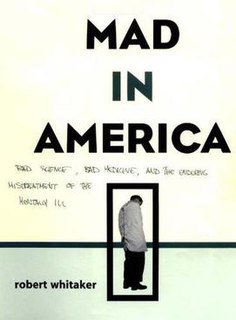 W
WAcres of Skin: Human Experiments at Holmesburg Prison is a 1998 book by Allen Hornblum. The book documents clinical non-therapeutic medical experiments on prison inmates at Holmesburg Prison in Philadelphia from 1951 to 1974, conducted under the direction of dermatologist Albert Kligman. The title of the book is a reference to Kligman's reaction on seeing hundreds of prisoners when he entered the prison: "All I saw before me were acres of skin" ... "It was like a farmer seeing a fertile field for the first time".
 W
WAequanimitas was one of Sir William Osler's most famous essays, delivered to new doctors in 1889 as his farewell address at the Pennsylvania School of Medicine. It was also the name of his first book of essays. In the essay, Osler advocates two qualities "imperturbability" and "equanimity". Between 1932 and 1953, more than 150,000 copies were given to medical graduates.
 W
WAnatomy of an Epidemic: Magic Bullets, Psychiatric Drugs, and the Astonishing Rise of Mental Illness in America is a book by Robert Whitaker published in 2010 by Crown. Whitaker asks why the number of Americans who receive government disability for mental illness approximately doubled since 1987.
 W
WThe Demon in the Freezer is a 2002 non-fiction book (ISBN 0345466632) on the biological weapon agents smallpox and anthrax and how the American government develops defensive measures against them. It was written by journalist Richard Preston, also author of the best-selling book The Hot Zone (1994), about ebolavirus outbreaks in Africa and Reston, Virginia and the U.S. government's response to them.
 W
WThe Demon Under the Microscope: From Battlefield Hospitals to Nazi Labs, One Doctor's Heroic Search for the World's First Miracle Drug is a 2006 nonfiction book about the discovery of Prontosil, the first commercially available antibacterial antibiotic and sulfanilamide, the second commercial antibiotic. Prontosil was the first commercially available antibacterial antibiotic (with a relatively broad effect against Gram-positive cocci. It was developed in the 1930s by a research team at the Bayer Laboratories of the IG Farben conglomerate in Germany. The discovery and development of this first sulfonamide drug opened a new era in medicine.
 W
WThe Discoverers is a non-fiction historical work by Daniel Boorstin, published in 1983, and is the first in the Knowledge Trilogy, which also includes The Creators and The Seekers. The book, subtitled A History of Man's Search to Know His World and Himself, is a history of human discovery. Discovery in many forms is described: exploration, science, medicine, mathematics, and more-theoretical ones, such as time, evolution, plate tectonics, and relativity. Boorstin praises the inventive, human mind and its eternal quest to discover the universe and humanity's place in it.
 W
WExplorers of the Body is a book by Steven Lehrer that tells the story of epochal medical discoveries which have profoundly affected human health, and the men and women who made them. From the ancient Egyptians and Babylonians to modern medical science, the book covers the gamut of medical advances, among them:Edward Jenner and smallpox vaccination Gregor Mendel and genetics Marie Curie and radioactivity Jonas Salk and the polio vaccine William Harvey and the circulation of the blood Louis Pasteur and rabies vaccination Joseph Lister and the rise of modern surgery
 W
WThe Ghost Map: The Story of London's Most Terrifying Epidemic – and How it Changed Science, Cities and the Modern World is a book by Steven Berlin Johnson in which he describes the most intense outbreak of cholera in Victorian London and centers on John Snow and Henry Whitehead.
 W
WA History of Medicine is a book by Scottish surgeon Douglas Guthrie that was published in 1945 by Thomas Nelson and Sons. It came to wide attention after it was reviewed by the playwright George Bernard Shaw and marked the beginning for Guthrie of a new career in teaching the history of medicine.
 W
WThe Hot Zone: A Terrifying True Story is a best-selling 1994 nonfiction thriller by Richard Preston about the origins and incidents involving viral hemorrhagic fevers, particularly ebolaviruses and marburgviruses. The basis of the book was Preston's 1992 New Yorker article "Crisis in the Hot Zone".
 W
WLoimologia, or, an historical Account of the Plague in London in 1665, With precautionary Directions against the like Contagion is a treatise by Dr. Nathaniel Hodges (1629–1688), originally published in London in Latin in 1672; an English translation was later published in London in 1720. The treatise provides a first-hand account of the Great Plague of London; it has been described as the best medical record of the epidemic. While most physicians fled the city, including the renowned Thomas Sydenham, and Sir Edward Alston, president of the Royal College of Physicians, Hodges was one of the few physicians who remained in the city during 1665, to record observations and test the effectiveness of treatments against the plague. The book also contains statistics on the victims in each parish.
 W
WMad in America: Bad Science, Bad Medicine, and the Enduring Mistreatment of the Mentally Ill is a 2002 book by medical journalist Robert Whitaker, in which the author examines and questions the efficacy, safety, and ethics of past and present psychiatric interventions for severe mental illnesses, particularly antipsychotics. The book is organized as a historical timeline of treatment development in the United States.
 W
WMedical Apartheid: The Dark History of Medical Experimentation on Black Americans from Colonial Times to the Present is a 2007 book by Harriet A. Washington. It is a history of medical experimentation on African Americans. From the era of slavery to the present day, this book presents the first detailed account of black Americans' abuse as unwitting subjects of medical experimentation.
 W
WOur Posthuman Future: Consequences of the Biotechnology Revolution is a 2002 book by Francis Fukuyama. In it, he discusses the potential threat to liberal democracy that use of new and emerging biotechnologies for transhumanist ends poses.
 W
WThe Protest Psychosis: How Schizophrenia Became a Black Disease is a 2010 book by the psychiatrist Jonathan Metzl, and published by Beacon Press, covering the history of the 1960s Ionia State Hospital—located in Ionia, Michigan and converted into the Ionia Correctional Facility in 1986. The facility is claimed to have been one of America's largest and most notorious state psychiatric hospitals in the era before deinstitutionalization.
 W
WSide Effects: A Prosecutor, a Whistleblower, and a Bestselling Antidepressant on Trial is a nonfiction book by investigative journalist Alison Bass, which tells the true story of a court case and the personal drama that surrounded the making of a bestselling drug. It chronicles the lives of two women – a prosecutor and a whistleblower – who exposed deception in the research and marketing of Paxil, an antidepressant prescribed to millions of children and adults. The book shows the connections between pharmaceutical giant GlaxoSmithKline, a top Ivy League research institution, and the government agency designed to protect the public – conflicted relationships that may have compromised the health and safety of vulnerable children.
 W
WVaccine: The Controversial Story of Medicine's Greatest Lifesaver is a 2007 book by freelance writer Arthur Allen. The book describes the history of vaccination, beginning in 1796 when the smallpox vaccine was pioneered by Edward Jenner, and including mandatory vaccination policies during World War II in the United States military. It ends on a discussion of the vaccine-autism controversy.